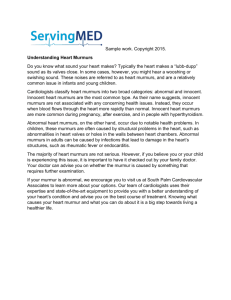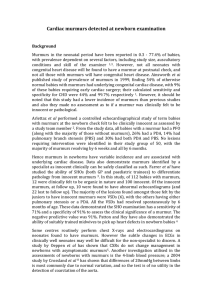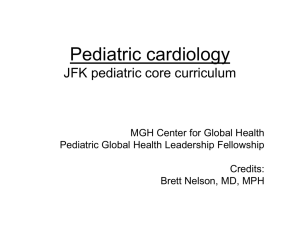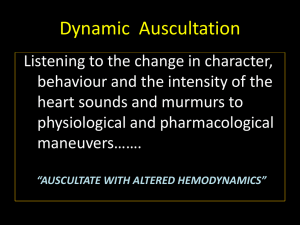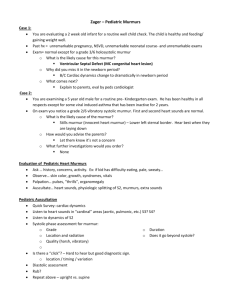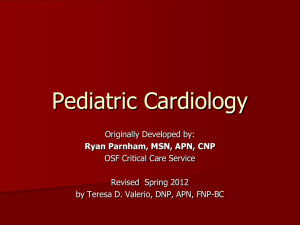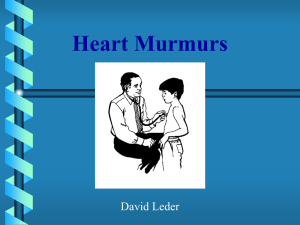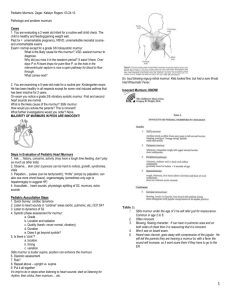Heart Murmur - Riverside County Public Health Nursing
advertisement
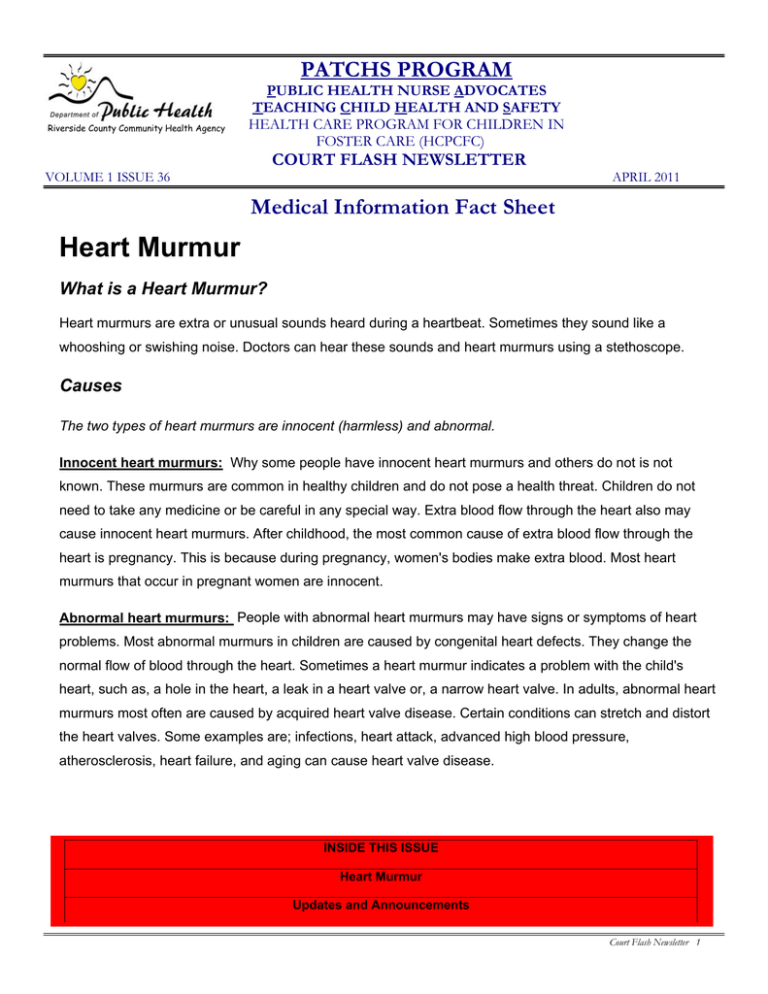
PATCHS PROGRAM Riverside County Community Health Agency PUBLIC HEALTH NURSE ADVOCATES TEACHING CHILD HEALTH AND SAFETY HEALTH CARE PROGRAM FOR CHILDREN IN FOSTER CARE (HCPCFC) COURT FLASH NEWSLETTER VOLUME 1 ISSUE 36 APRIL 2011 Medical Information Fact Sheet Heart Murmur What is a Heart Murmur? Heart murmurs are extra or unusual sounds heard during a heartbeat. Sometimes they sound like a whooshing or swishing noise. Doctors can hear these sounds and heart murmurs using a stethoscope. Causes The two types of heart murmurs are innocent (harmless) and abnormal. Innocent heart murmurs: Why some people have innocent heart murmurs and others do not is not known. These murmurs are common in healthy children and do not pose a health threat. Children do not need to take any medicine or be careful in any special way. Extra blood flow through the heart also may cause innocent heart murmurs. After childhood, the most common cause of extra blood flow through the heart is pregnancy. This is because during pregnancy, women's bodies make extra blood. Most heart murmurs that occur in pregnant women are innocent. Abnormal heart murmurs: People with abnormal heart murmurs may have signs or symptoms of heart problems. Most abnormal murmurs in children are caused by congenital heart defects. They change the normal flow of blood through the heart. Sometimes a heart murmur indicates a problem with the child's heart, such as, a hole in the heart, a leak in a heart valve or, a narrow heart valve. In adults, abnormal heart murmurs most often are caused by acquired heart valve disease. Certain conditions can stretch and distort the heart valves. Some examples are; infections, heart attack, advanced high blood pressure, atherosclerosis, heart failure, and aging can cause heart valve disease. INSIDE THIS ISSUE Heart Murmur Updates and Announcements Court Flash Newsletter 1 What Are the Signs and Symptoms of an Abnormal Heart Murmur? People who have abnormal heart murmurs may have signs or symptoms of the heart problems causing the murmurs. Signs and symptoms depend on the problem causing the heart murmur and its severity. • Poor eating and abnormal growth (in infants) • Shortness of breath, which may occur only with physical exertion • Excessive sweating with no clear cause • Chest pain • Dizziness or fainting • A bluish color on the skin, especially on the fingers and lips Diagnosis If a doctor suspects a problem, he or she may choose to refer the child to a cardiologist. The cardiologist will carefully listen to the child's heart with a stethoscope to find out whether a murmur is innocent or abnormal. He or she will listen to the loudness, location, and timing of the murmur. The doctor may request for additional tests to be performed. These tests include chest X-ray, electrocardiogram (EKG or ECG) or echocardiogram. Treatment Innocent (Harmless) Heart Murmurs Healthy children who have innocent (harmless) heart murmurs don't need treatment. Their heart murmurs aren't caused by heart problems or other conditions. Pregnant women who have innocent heart murmurs due to extra blood volume also don't need treatment. Their heart murmurs should go away after pregnancy. Abnormal Heart Murmurs If an adult or a child has an abnormal heart murmur, the doctor will recommend treatment for the disease or condition causing the murmur. Currently, no medicines can cure heart valve disease. However, lifestyle changes and medicines can treat symptoms and help delay complications. Eventually, though, the patient may need surgery to repair or replace a faulty heart valve. Some heart murmurs occur because of an illness outside of the heart. The heart is normal, but an illness or condition can cause blood flow that's faster than normal. Examples of this type of illness include fever, anemia , and hyperthyroidism. Treating these conditions should make the heart murmur go away. Court Flash Newsletter 2 Other Names for a Heart Murmur Innocent Heart Murmurs • Benign heart murmurs. • Flow murmurs. • Functional heart murmurs. • Mammary souffle (heard in some pregnant women because of increased blood flow to the breasts.) • Normal heart murmurs. • Physiologic heart murmurs. • Still's murmurs. • Venous hums. Abnormal Heart Murmurs • Pathologic heart murmurs Heart Murmur. (2010, August). National Heart, Lung and Blood Institute: National Institutes of Health. Retrieved March 31,2011 from http://www.nhlbi.nih.gov/health/dci/Diseases/heartmurmur/hmurmur_what.html Editors: Kristen Thompson, Senior PHN & Shena Patel, PHN Contributors: Craig Demers, PHN, Assistant Nurse Manager, Carol Hernandez, PHN, Nurse Manager and Hermia Parks, MA, Director of Public Health Nursing. HCPCFC PROGRAM UPDATES AND ANNOUNCEMENTS. HCPCFC nurses continue to collaborate and coordinate with various departments and agencies to ensure the health and safety of children in foster care. We would like to welcome Deborah Allen and Shena Patel to HCPCFC. Court Flash Newsletter 3
